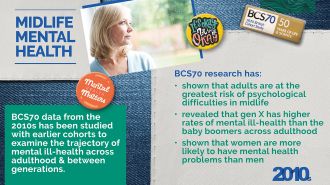
- Our studies
- Our research
- Publications and resources
- Data access and training
- About
- News
- Events
- Get in touch
- Join our mailing list

Welcome to our news and blogs section. Here you’ll find the latest developments and insights from across our longitudinal studies.
Young people from more deprived neighbourhoods have to wait up to 15 minutes longer for accident and emergency (A&E) treatment than their more advantaged peers with similar healthcare needs, according to new findings from Next Steps.

Children who express positive thoughts and feelings in their creative writing are less likely to show symptoms of depression at the age of 23, according to research led by Chapman University in California.

Up to one in five adults with a history of poor mental health reported they were ‘much worse off’ financially a year into the COVID-19 pandemic, compared to one in ten of those who had never had psychological problems in adulthood.

The 1970 British Cohort Study (BCS70) has been an important source of evidence on midlife mental health, helping to improve our understanding about why middle age is such a vulnerable period for adults.

Baby Boomers and Generation X are at the greatest risk of mental ill-health in middle age, finds new research by UCL.

Over the years, men who waited until their mid-20s to have their first child tended to report the best health in middle age, compared to those who started a family earlier. But, more recently, those who delayed fatherhood until their mid-30s appeared to be the healthiest in midlife.

Among the Baby Boomers and Generation X, people who had higher levels of emotional wellbeing during childhood and adolescence were more likely to report being satisfied with life when they reached adulthood.
At this event, organised by CLOSER, we will present results on the measurement properties of mental health measures, before and after harmonising these so that they can be compared across time and study.
CLS are pleased to be presenting at this CLOSER workshop aimed at lecturers. This free one-day workshop will give an overview of longitudinal data available to lecturers who teach and supervise students in quantitative social science subjects.
Held at the University of Edinburgh, this workshop gave both first-time and more experienced data users an insight into four of the UK’s internationally-renowned cohort studies run by the Centre for Longitudinal Studies (CLS). The slides from this workshop are available to download from this page.
The National Child Development Study (NCDS) is “one of the most influential pools of data that possibly the world has ever seen”, explains the former Labour minister and chair of the Social Mobility Commission, Alan Milburn, in a new short documentary film from the Centre for Longitudinal Studies (CLS).

The latest version of the National Child Development Study: Partnership Histories (1974-2013) has been released at the UK Data Service.

Researchers have called into question the apparent benefits of light alcohol consumption – as well as the supposed ‘risks’ of not drinking – after examining the drinking habits of middle-aged Britons.
Ryan Bradshaw
Senior Communications Officer
Phone: 020 7612 6516
Email: r.bradshaw@ucl.ac.uk